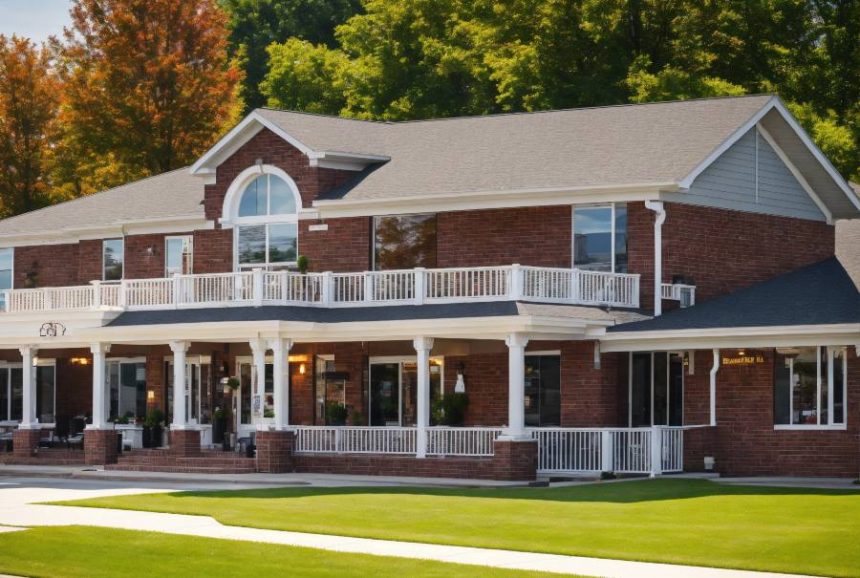Limestone Commercial Real Estate Opiniones

In the dynamic realm of commercial real estate, choices regarding building materials can significantly impact the aesthetic appeal, durability, and overall value of a property. Limestone, a sedimentary rock formed over millions of years, has emerged as a unique and versatile option for commercial real estate developers. In this article, we delve into the opinions surrounding limestone in the commercial real estate sector, exploring its benefits, drawbacks, and the potential it holds for shaping the future of modern architecture.
The Timeless Allure of Limestone
Limestone, with its natural, earthy tones and timeless appeal, has been a favorite building material for centuries. From ancient structures like the Great Pyramid of Giza to iconic landmarks such as the Empire State Building, limestone has proven its durability and aesthetic versatility. In contemporary commercial real estate, this classic material is making a resurgence, earning accolades for its ability to seamlessly blend tradition with modernity.
Opinions on Aesthetics
One of the primary reasons behind the growing popularity of limestone in commercial real estate is its aesthetic appeal. Architects and developers appreciate the natural beauty and warmth that limestone exudes, adding a touch of sophistication to any structure. Its neutral tones and subtle variations contribute to a sense of timelessness, making it suitable for a wide range of architectural styles.
Limestone’s adaptability extends beyond its color palette. The rock can be shaped and carved into intricate designs, offering architects a wide range of possibilities for creating unique facades and ornamental elements. This flexibility is particularly attractive to those aiming to construct buildings that stand out while maintaining a sense of classic elegance.
Durability and Longevity
Beyond its visual allure, limestone is celebrated for its exceptional durability. Commercial real estate developers often view limestone as a wise long-term investment due to its ability to withstand the test of time and harsh weather conditions. As a dense sedimentary rock, limestone boasts a natural resistance to erosion, making it an ideal choice for exterior cladding.
Opinions on Maintenance
While limestone is durable, opinions on its maintenance requirements vary. Some argue that the stone’s porous nature can make it susceptible to staining and weathering over time. However, proponents of limestone contend that proper sealing and regular maintenance can mitigate these concerns, allowing the material to retain its pristine appearance for decades.
Additionally, advancements in sealant technologies have addressed some of the maintenance challenges associated with limestone. Developers and property owners can now choose from a variety of sealants that provide protection against moisture, stains, and other environmental factors. This has contributed to a more positive perception of limestone as a low-maintenance building material.
Sustainability Considerations
In an era where sustainability is a key consideration in construction, the opinions on limestone’s eco-friendliness are mixed. On one hand, limestone is a natural material that doesn’t require extensive processing or manufacturing, reducing its environmental footprint compared to some synthetic alternatives. Its abundance in nature also contributes to its appeal from a sustainability standpoint.
However, critics argue that the extraction of limestone from quarries can have environmental consequences, such as habitat disruption and landscape alteration. Furthermore, the energy-intensive process of quarrying and transporting limestone to construction sites raises questions about its overall environmental impact. As the industry shifts towards more sustainable practices, opinions on the ecological viability of limestone may play a pivotal role in its future adoption.
Cost Considerations
Another factor influencing opinions on limestone in commercial real estate is its cost. Limestone is generally considered a premium building material, and its price can vary depending on factors such as quality, origin, and finish. While some developers view the initial investment in limestone as justified by its durability and aesthetic benefits, others may opt for more budget-friendly alternatives.
Opinions on Value Appreciation
One compelling argument in favor of using limestone in commercial real estate is its potential to enhance property value. Buildings featuring limestone exteriors often command higher resale values, as the material is associated with quality, longevity, and a timeless aesthetic. The allure of owning a property constructed with a durable and prestigious material like limestone can be a strong selling point in the competitive real estate market.
Cultural and Regional Influences
Opinions on limestone can also be shaped by cultural and regional influences. In some areas, limestone may be deeply ingrained in the local architectural heritage, leading to a positive perception of its use in new developments. Conversely, in regions where alternative materials are more prevalent, there may be resistance to adopting limestone as a mainstream building material.
Future Trends and Innovations
As the commercial real estate industry evolves, so do opinions on building materials like limestone. Innovations in quarrying, processing, and sustainable sourcing practices may address some of the concerns associated with limestone. Additionally, emerging technologies in architectural design and construction techniques could open up new possibilities for utilizing limestone in innovative ways, further influencing opinions within the industry.
Conclusion
The opinions on limestone commercial real estate are diverse and multifaceted, reflecting the complex considerations that developers, architects, and investors weigh when choosing building materials. While some praise limestone for its timeless aesthetics, durability, and potential value appreciation, others express concerns about its maintenance requirements, environmental impact, and upfront costs.
Ultimately, the choice of limestone in commercial real estate is subjective and dependent on a combination of factors, including project goals, budget constraints, and regional preferences. As the industry continues to evolve, so too will the opinions on limestone, shaping its role in the construction landscape of the future. Whether as a classic choice that stands the test of time or a material that undergoes transformative innovations, limestone’s place in commercial real estate remains an intriguing topic for discussion and exploration.





